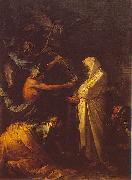Wholesale Oil Painting No Minimum |
|||||||||||
|
|
|||||||||||

|
|||||||||||
|
|
|
||||||||
Salvator Rosa1615-1673 Italian Salvator Rosa Galleries Salvatore Rosa (1615 - March 15, 1673) was an Italian Baroque painter, poet and printmaker, active in Naples, Rome and Florence. As a painter, he is best known as an "unorthodox and extravagant" and a "perpetual rebel" proto-Romantic. His life and writings were equally colorful. He continued apprenticeship with Falcone, helping him complete his battlepiece canvases. In that studio, it is said that Lanfranco took notice of his work, and advised him to relocate to Rome, where he stayed from 1634-6. Returning to Naples, he began painting haunting landscapes, overgrown with vegetation, or jagged beaches, mountains, and caves. Rosa was among the first to paint "romantic" landscapes, with a special turn for scenes of picturesque often turbulent and rugged scenes peopled with shepherds, brigands, seamen, soldiers. These early landscapes were sold cheaply through private dealers. This class of paintings peculiarly suited him. He returned to Rome in 1638-39, where he was housed by Cardinal Francesco Maria Brancaccio, bishop of Viterbo. For the Chiesa Santa Maria della Morte in Viterbo, Rosa painted his first and one of his few altarpieces with an Incredulity of Thomas. While Rosa had a facile genius at painting, he pursued a wide variety of arts: music, poetry, writing, etching, and acting. In Rome, he befriended Pietro Testa and Claude Lorraine. During a Roman carnival play he wrote and acted in a masque, in which his character bustled about Rome distributing satirical prescriptions for diseases of the body and more particularly of the mind. In costume, he inveighed against the farcical comedies acted in the Trastevere under the direction of Bernini. While his plays were successful, this also gained him powerful enemies among patrons and artists, including Bernini himself, in Rome. By late 1639, he had had to relocate to Florence, where he stayed for 8 years. He had been in part, invited by a Cardinal Giancarlo de Medici. Once there, Rosa sponsored a combination of studio and salon of poets, playwrights, and painters --the so called Accademia dei Percossi ("Academy of the Stricken"). To the rigid art milieu of Florence, he introduced his canvases of wild landscapes; while influential, he gathered few true pupils. Another painter poet, Lorenzo Lippi, shared with Rosa the hospitality of the cardinal and the same circle of friends. Lippi encouraged him to proceed with the poem Il Malmantile Racquistato. He was well acquainted also with Ugo and Giulio Maffei, and housed with them in Volterra, where he wrote four satires Music, Poetry, Painting and War. About the same time he painted his own portrait, now in the National Gallery, London. |
||||||||
|
|
||||||||
L ombre de Samuel apparaissant a Saul chez la pythonisse d Endor.
L ombre de Samuel apparaissant a Saul chez la pythonisse d Endor. Painting ID:: 66708 |
273 ?? 193 cm (107.48 ?? 75.98 in)
Oil on canvas
1668
273 ?? 193 cm (107.48 ?? 75.98 in) Oil on canvas 1668 |
|||||||
|
CONTACT US |

